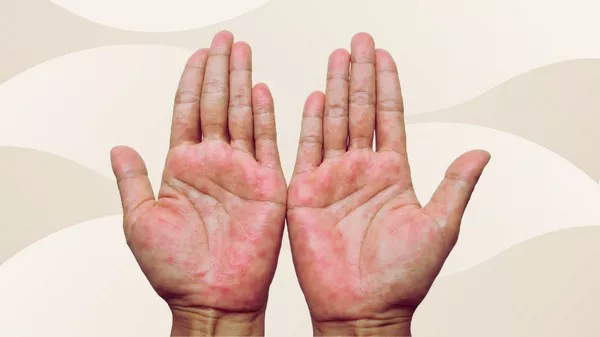Eczema, a chronic skin condition characterized by inflammation, itching, and redness, affects millions of individuals worldwide. Among its diverse manifestations, swelling in the hands is a concern frequently reported by sufferers. But does eczema truly cause swelling in the hands? Unraveling this connection requires a deeper understanding of both eczema and its potential systemic effects. In this comprehensive exploration, we delve into the mechanisms behind eczema-related hand swelling, the associated symptoms, diagnosis, treatment options, and management strategies.
Understanding Eczema: A Primer
Eczema, also known as atopic dermatitis, is a multifactorial condition involving genetic predispositions, immune dysregulation, environmental triggers, and impaired skin barrier function. It commonly presents with symptoms such as itching, redness, dryness, and inflammation. While eczema can affect various parts of the body, including the face, neck, elbows, and knees, involvement of the hands is prevalent, particularly in adults.
The Mechanism of Hand Swelling in Eczema
Swelling in the hands associated with eczema can stem from several underlying factors:
1. Inflammation: Eczema triggers an inflammatory response in the skin, leading to vasodilation and increased permeability of blood vessels. This process can result in fluid accumulation in the tissues, manifesting as swelling, particularly in areas with thinner skin layers, such as the hands.
2. Scratching and Trauma: Persistent itching, a hallmark symptom of eczema, often prompts individuals to scratch the affected areas vigorously. This mechanical trauma can damage the skin barrier, exacerbating inflammation and potentially causing localized swelling in the hands.
3. Secondary Infections: The compromised skin barrier in eczema patients makes them more susceptible to bacterial, viral, and fungal infections. Secondary infections can further exacerbate inflammation and swelling in the affected regions, including the hands.
4. Contact Dermatitis: Some individuals with eczema may experience allergic reactions or irritant contact dermatitis upon exposure to certain substances, such as detergents, soaps, or chemicals. Contact dermatitis can manifest with symptoms like swelling, redness, and blistering, often localized to the hands.
Symptoms of Eczema-Related Hand Swelling
In addition to swelling, individuals with eczema may experience a range of symptoms in their hands, including:
- Itching: Intense itching is a hallmark symptom of eczema and often precedes swelling.
- Redness: Inflamed skin in the affected areas may appear red or flushed.
- Dryness: Eczema can cause excessive dryness and scaling of the skin on the hands.
- Cracks and Fissures: Severe eczema may lead to the development of cracks and fissures, further exacerbating swelling and discomfort.
- Pain and Tenderness: Swollen hands can be tender to the touch and may cause varying degrees of discomfort or pain.
Diagnosis and Differential Diagnosis
Diagnosing eczema-related hand swelling involves a thorough evaluation of the patient’s medical history, clinical presentation, and, in some cases, additional tests such as skin patch testing or skin biopsy to rule out other possible causes. Differential diagnosis may include:
- Psoriasis: Psoriasis, another chronic skin condition, can present with symptoms similar to eczema, including swelling and inflammation of the hands.
- Contact Dermatitis: Allergic or irritant contact dermatitis can mimic eczema and may require patch testing to identify specific triggers.
- Infectious Causes: Bacterial, viral, or fungal infections can also lead to hand swelling, particularly in individuals with compromised skin barriers.
Treatment Strategies
The management of eczema-related hand swelling aims to alleviate symptoms, reduce inflammation, and restore the skin barrier. Treatment strategies may include:
- Topical Corticosteroids: These anti-inflammatory medications are commonly prescribed to reduce itching, redness, and swelling associated with eczema flare-ups.
- Emollients and Moisturizers: Regular application of emollients and moisturizers helps hydrate the skin, improve its barrier function, and reduce dryness and scaling.
- Topical Calcineurin Inhibitors: These medications modulate the immune response and are used as alternatives to corticosteroids, especially in sensitive areas like the face and hands.
- Antihistamines: Oral antihistamines may be prescribed to relieve itching and promote sleep, particularly in cases of severe pruritus.
- Avoidance of Triggers: Identifying and avoiding triggers such as irritants, allergens, or certain foods can help prevent eczema flare-ups and subsequent hand swelling.
- Wet Wrap Therapy: In severe cases, wet wrap therapy may be recommended to hydrate the skin and enhance the absorption of topical medications.
Lifestyle Modifications and Preventive Measures
In addition to medical treatment, certain lifestyle modifications and preventive measures can help manage eczema and reduce the risk of hand swelling:
- Gentle Skin Care: Using mild, fragrance-free cleansers and avoiding hot water can help maintain the skin’s natural moisture barrier.
- Protective Clothing: Wearing gloves when performing tasks that may irritate or expose the hands to potential triggers can help prevent flare-ups.
- Stress Management: Stress can exacerbate eczema symptoms, so practicing stress-reduction techniques such as mindfulness, meditation, or yoga may be beneficial.
- Maintaining Optimal Skin Hydration: Drinking an adequate amount of water and using humidifiers in dry environments can help prevent skin dryness and minimize eczema flare-ups.
Conclusion
While eczema is primarily characterized by inflammation and itching, swelling in the hands can often accompany the condition, posing significant discomfort and impairment in affected individuals. Understanding the mechanisms underlying eczema-related hand swelling is crucial for accurate diagnosis and effective management. By employing a combination of medical treatments, lifestyle modifications, and preventive measures, individuals with eczema can achieve better symptom control, improved quality of life, and minimized hand swelling. Collaborative efforts between patients and healthcare providers are essential in navigating the complexities of eczema management and optimizing outcomes for those affected by this chronic skin condition.
Related Topics:
What Supplements to Take for Eczema

























